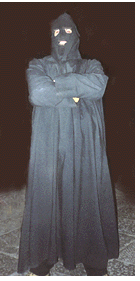...Best of Sicily
presents... Best of Sicily Magazine. ... Dedicated to Sicilian art, culture, history, people, places and all things Sicilian. |
by Roberto Savona | ||
Magazine Best of Sicily Arts & Culture Fashion Food & Wine History & Culture About Us Travel Faqs Contact Map of Sicily |
The events of Natoli's novel take place in Palermo in the pivotal years between 1698 and 1719. Complete with secret passages, historical figures and, of course, real places in the Sicilian capital, I Beati Paoli paints a picture of a secret society that seeks to challenge the authority of both Church and State, two social forces which were not always in harmony with each other. During this period, the Inquisition was in full flower, executions were normal, and the Sicilian Crown was passed from Spain to Piedmont to Austria. The kings ruled from afar, leaving administration and justice to viceroys and compliant retainers. Certain religious confraternities were accomplices of the Inquisition --full of zealots and spies. Nobody seems to know the exact origin of the sect's name, but it may reflect a devotion to the "Beato Paola," Saint Francis of Paola. The thought of black-hooded "avengers" fighting to defend the oppressed appealed to many ordinary people. (No wonder that the idea gave Fascist censors cause for concern centuries later.) Little is known of the historical Beati Paoli, but the books bear more than a veneer of truth. In the seventeenth century, heresy and treason were punishable by death. Unauthorized assemblies were discouraged. That secret societies were outlawed implies that they existed in some form. It is quite possible, as some have suggested, that certain secret fraternities met covertly in the subterranean passages of Palermo --built on the remains of catacombs constructed in the Punic era, and underground channels designed by the Arabs and Normans. They could have used a few segments of these channels to travel secretly around the city. Old Palermo is a vast labyrinth of streets dating from ancient and medieval times, and in Natoli's story the Beati Paoli are strongly identified with the Capo district, where a street and square now bear the sect's name. But did the Beati Paoli plot revolution and social change? We shall never know. Nothing of this kind has been attributed to them by mainstream historians, but their era was characterised by riots whose leaders often went unidentified. This has given rise to the theory that an underground movement plotted some of the revolts. The Beati Paoli would most likely have been nobles and intellectuals unwilling to openly challenge the established order. It is also possible that their "revolution" amounted to little more than (literally) underground meetings to discuss illegal ideas. That alone could have found them tried as heretics or traitors. But there's a paradox here. Since they were a secret society by definition, the Beati Paoli would not have sought publicity or left documentary proof of their existence. To have done so was to risk death. For their part, the authorities would not know to attribute a particular murder or event to an organisation whose very existence was little more than a subdued whisper. Like the Ninja of feudal Japan, the Beati Paoli of popular legend stalked the urban landscape at night, dressed entirely in black, their faces concealed by hoods. Their costume was not unlike that of the typical hooded executioner. A secret society whose very existence was virtually unknown by the centres of power? The same could have been said of the Mafia for many decades. In its infancy, Freemasonry was also very secretive and even revolutionary, and the thirteenth-century War of the Sicilian Vespers was instigated by a secret committee of noblemen. The Beati Paoli, whoever they were, eventually went the way of the duel and the vendetta. But their legend lives on. About the Author: Agrigento native Roberto Savona writes about historical topics. (This article was translated from Italian.) | |
Top of Page |
 Did they ever actually exist? Luigi Natoli's historical novel, I Beati Paoli, describes a secret sect resembling an order of knights, a confraternity, the Freemasons and the Ninja. First published in serial form in 1909 under the pseudonym William Galt, The Beati Paoli was printed as a book in 1921, and then again in 1949. (The gap in its early publishing history coincides with Fascist censorship of
"revolutionary" materials.) Writing in the 1830s, Gabriele Quattromani
and Vincenzo Linares referred to the same sect. Carmelo Piola wrote a book
about the Beati Paoli in the revolutionary year of 1848. A film, The
Black Masked Knights, was made in 1947, based on Natoli's book.
Did they ever actually exist? Luigi Natoli's historical novel, I Beati Paoli, describes a secret sect resembling an order of knights, a confraternity, the Freemasons and the Ninja. First published in serial form in 1909 under the pseudonym William Galt, The Beati Paoli was printed as a book in 1921, and then again in 1949. (The gap in its early publishing history coincides with Fascist censorship of
"revolutionary" materials.) Writing in the 1830s, Gabriele Quattromani
and Vincenzo Linares referred to the same sect. Carmelo Piola wrote a book
about the Beati Paoli in the revolutionary year of 1848. A film, The
Black Masked Knights, was made in 1947, based on Natoli's book.